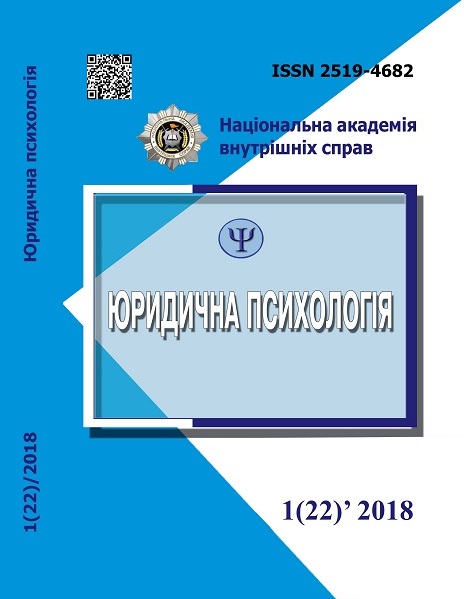Formation of Psychological Readiness of Police Officers for the Use of Coercive Measures
Abstract
The analysis of the guiding documents regulating the use of police measures by law enforcement officers was carried out. The essence of concepts "police coercive measures", "psychological readiness" is revealed. The peculiarities in the use of police coercive measures by police officers during the performance of official activities are analyzed. Based on the survey, it was determined that for the most part (81,3 %) the performance of official duties provided for the use of police precautionary measures only. In 18,7 % of the situations, patrols had to resort to coercive police measures. The reasons that reduce the effectiveness of forming the psychological readiness of patrol police officers for the use of police coercive measures are established. The internal and external factors influencing the decision making by the employee to the use of police coercive measures are revealed. Internal is the level of psychophysical preparedness and the formation of skills in assessing the level of danger, the ability to predict the possible development of the situation, the ability to transition from preventive measures to coercion and vice versa. External factors are: presence of distracting factors (time of day, illumination of a place of collision, weather conditions, foreign citizens, etc.); the ratio of offenders and policemen, the level of preparedness of offenders, the presence of weapons, etc. A number of pedagogical conditions have been identified and substantiated, the application of which should contribute to the formation of psychological readiness of law enforcement officers for the use of coercive measures by the police, namely: the development of motivation for education, raising the level of their own professional preparedness and self-improvement; formation of a system of professionally meaningful knowledge, skills, skills and qualities through the introduction of a practical component in the educational process; proper level of logistics of the educational process; sufficient level of professional competence of teachers (instructors); the involvement of future patrol police officers in active non-academic activities of a professional-practical orientation.
Downloads
Abstract views: 378 PDF Downloads: 128
- Authors reserve the right to authorship of their own work and transfer to the magazine the right of the first publication of this work under the terms of the Creative Commons Attribution License, which allows other persons to freely distribute published work with mandatory reference to authors of the original work and the first publication of an article in this magazine.
- Authors have the right to enter into separate additional agreements on non-exclusive dissemination of the work in the form in which it was published in the journal (for example, to post an article in the institution's repository or to publish as part of a monograph), provided that the link to the first publication of the work in this journal is maintained.
- The journal's policy allows and encourages the posting of articles by authors on the Internet (for example, in electronic storehouses of institutions or on personal websites), both before the submission of this manuscript to the editorial office and during its editorial processing, as this contributes to the creation of a productive scientific discussion and positively affects the efficiency and dynamics of citing the published work.




